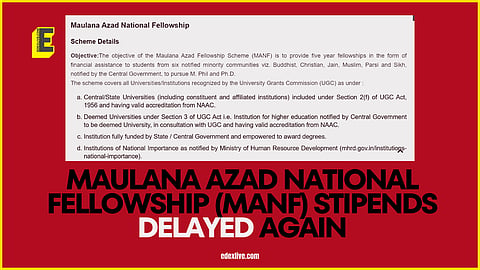

Research scholars under the Maulana Azad National Fellowship (MANF) scheme, an initiative by the Ministry of Minority Affairs (MoMA) to support minority community students pursuing PhD degrees, are once again battling delays in stipend disbursements.
Despite the scheme’s objective to provide financial assistance to students from minority (Buddhist, Christian, Jain, Muslim, Parsi, and Sikh) communities, the recurring issue of untimely payments has left scholars in financial as well as emotional distress.
As of March 2025, many have not received their stipends since December 2024, exacerbating an already aggravated situation.
The MANF scheme, implemented through the National Minorities Development and Finance Corporation (NMDFC), was discontinued for new applicants in the 2022-23 academic year, but promised support to the existing beneficiaries.
However, the latest delay, now stretching into the fourth month of 2025, has reignited concerns about the government’s commitment to these scholars.
EdexLive spoke to scholars who further informed that the House Rent Allowance (HRA) for MANF fellows has not been revised in line with recent University Grants Commission (UGC) guidelines, which they deem is a glaring disparity shown towards them as they are repeatedly exposed to episodes of discrimination.
An unending problem
The current crisis is not new.
In February 2024, EdexLive reported that MANF scholars had not received their stipends for five months, even as MoMA announced a revision in fellowship rates, as per UGC norms, at Rs 37,000 for Junior Research Fellows (JRF) and Rs 42,000 for Senior Research Fellows (SRF), effective from January 1, 2023.
At the time, the NMDFC website relayed that Rs 25.34 crore had been released to approximately 2,000 scholars for October 2022 to January 2023, but no further updates on disbursements were provided on the official websites of MoMA or National Minorities Development & Finance Corporation (NMDFC).
Fast forward to 2025, and the situation still remains dire.
A research scholar at the Aligarh Muslim University (AMU), told EdexLive that he last received his fellowship in December 2024. “It’s been three months without funds,” he said and added, “I’ve been contacting MoMA and NMDFC repeatedly, but all I get are vague responses. An NMDFC official told me the funds haven’t been released by the ministry.”
They further highlighted the absence of HRA revision, pointing to a UGC memorandum dated October 9, 2024, which increased HRA rates for Junior Research Fellowship (JRF) by a certain percentage, effective January 1, 2024, based on city classifications, such as 30% of basic pay for ‘X’ cities, 20% for ‘Y’ cities, and 10% for ‘Z’ cities.
“MANF scholars have been left out of this hike, giving rise to a financial disparity between research fellowships,” they added.
The AMU scholar's attempts to seek clarity have been met with indifference.
On March 12, 2025, they emailed MoMA and NMDFC, requesting HRA's revision and timely disbursal.
The response from Prasoon Kumar Jha, Under Secretary of the Scholarships Office, stated that the ministry was in the process of getting the MANF scheme approved for implementation from 2022-23 onwards and asked him to “appreciate the constraints.”
"We receive this auto-generated email every time we reach out to them," said the scholar. Furthermore, a follow-up query was met with a similar dismissive response: “We have no other information to provide.”
A month earlier, he filed a Right to Information (RTI) plea via the Centralised Public Grievance Redress and Monitoring System (CPGRAMS), but he has yet to receive a response.
Scholars speak out
The impact of these delays extends beyond finances, affecting scholars’ academic progress and mental well-being.
Mohd Rizwan, a PhD scholar in the Department of Urdu at Delhi University, narrating a similar ordeal in October 2023, when payments were delayed for months, said, "It’s happening again...The budget for the financial year has been passed, but there’s no transparency or clarity from the government. Every time, they say there are no funds. How can there not be any funds? What do they do with the allocated money?”
Rizwan emphasised the importance of the fellowship, stating, “This is our only source of income. Without it, our research suffers, and there’s no peace of mind. We borrow money from here and there just to survive, but the uncertainty is unbearable.”
Jaspreet Singh, a final-year PhD scholar in Social Sciences at the University of Jammu, echoed these sentiments. “I’m 32 years old, how does it feel to ask my family for money at this age, especially due to circumstances beyond my control?” he questioned.
As a social researcher, Singh relies heavily on fieldwork, which involves travel, lodging, and healthcare expenses. The delay has taken a toll on both his personal and professional life. “I recently missed a conference in Delhi because I couldn’t afford to attend it,” he said.
He further added, “This isn’t the first time, I once went nine months without a stipend. The inconsistency affects my productivity and research. My mind is constantly diverted due to this."
Last year, the All India Research Scholars Association (AIRSA) campaigned under the hashtag #HikeInMANFtoo in 2023 to demand equitable fellowship rates and timely disbursals. While the 2024 hike in stipend rates was good news, the problem is yet to be addressed.
These scholars are now demanding not only the immediate release of pending stipends but also a revision of HRA in line with UGC norms and greater transparency in fund allocation.
